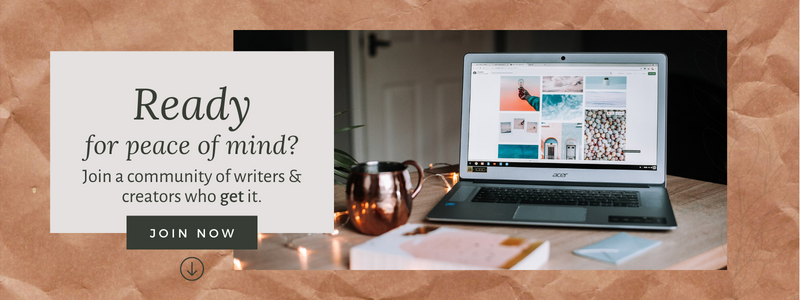When you need to write, but you don’t know where to start — or how to start — writing feels like the hardest thing in the world.
If you’re like most writers, at some point in your career you’ve experienced writer’s block. Whether it takes the form of an inability to finish what you start, a shortage of ideas, or an overall lack of motivation, writer’s block can be debilitating. It can make writing feel more like a chore than something you actually enjoy doing.
What is writer’s block?
Not all writers use the term “block” to describe their writing struggles. Some prefer another word, such as a “writer’s slump.” Whatever you call it, writer’s block is a well-known phenomenon. It causes us to feel stuck or overwhelmed. You might lose the urge, the desire, or the ability to write. And while writers know to expect the occasional dry spell, writer’s block seems to strike most often at the most inconvenient of times: when you have a deadline, an important paper due, or a draft to complete.
When writer’s block hits, it can be paralyzing — especially if time is not on your side. And if you don’t know how to deal with it, it can really shake your confidence. Writer’s block can make you feel insecure and afraid to pursue your writing career. If you have chronic writer’s block, you’ll need to figure out what the root of it is. Changing your approach to writing can help you stay consistent, productive, and enjoy creating again.
What causes writer’s block?
There are many possible causes of writer’s block. Here are 4 of the most common reasons that writers feel stuck:
1. You’re not sure what to write about.
This is a common problem, especially with creative writers. It’s hard to be handed a blank piece of paper and told to “write.” If you’re feeling pressure to come up with something new and exciting, your brain will often shut down on you. You might feel like all the “good ideas” have been taken, and nothing you say is original enough.
2. You’re not motivated.
It can be hard to find the motivation to write when you don’t feel like it. This might be because you’re nursing a bruised ego from bad feedback. It might also be because you’re just not into the topic you’re writing about. If you have depression, anxiety, ADHD, or another mental health condition, you may not have the mental energy to tackle writing.
3. You don’t have a writing process that works for you.
To get a job as a professional writer, you’ll need a good creative process in place — one that helps you get your word count in even when you don’t feel like it. If you find that writer’s block is getting in the way of work, you might just need to create a writing routine that works for you.
4. Your anxiety is getting in the way.
When the symptoms of writing anxiety are really strong, we might feel paralyzed or “go blank” every time we try to write. Many times, this isn’t about whether we think our writing is good enough. It’s about a bigger “what if?” lurking behind our frozen fingers or that blank screen.

Writer’s block and anxiety
Many things can cause writer’s block, but often it boils down to anxiety. We worry that our ideas aren’t good enough, that we’ll never be able to finish our book, or that we’re just not cut out for this writing life.
Sometimes, what we’re actually afraid of is becoming a success. We think that if we get the piece out there, and the world sees it, we might lose friends and family. Or even worse — they might want us to write a second article, book, or paper, and we’d have blown our best ideas on the first one.
Ultimately, when anxiety culminates in writer’s block, it’s not writing that we’re really afraid of. It’s the what-might-happen if we finish the thing and turn it in. We worry that it won’t be perfect, that it will be perfect. We worry that they’ll hate us or hate our work. Or even worse — that there’ll be a typo. ::shudder::
The truth is, we all have stories to tell and the world needs our words. This doesn’t mean that you should never feel discouraged or scared — that’s normal, too. But you don’t need to fear the judgment of others, and your career isn’t riding on a perfect first draft.
However, as a professional writer, I feel the need to hit you with a hard truth.
Your career won’t end because of a messy first draft. But it might end if you don’t turn in that draft at all.
Writers and editors understand writer’s block — but they can’t do anything with a blank page. You can’t read it, you can’t edit it, and unless you’re making your fortune in journals, you can’t sell it. The best thing you can do for yourself — and your future career — is to recognize what it feels like to be stuck, and practice getting unstuck as fast as you can.
How long does writer’s block last?
Writer’s block lasts for about as long as you let it.
Now, that’s not to say you can “force” inspiration. Some writers report feeling blocked for months or even years at a time. This causes writers to reread their work, struggle with a topic, and stare at blank pages for an extended period of time. Some writers, with very famous titles and shows on network television, don’t ever finish their sagas.
I think that although writer’s block is a very common problem for writers, it shouldn’t stop you from writing. I’ll readily admit that I can be in a creative slump for weeks or months at a time. But because my family depends on me to make money as a writer, that doesn’t mean I just stop writing for that whole time.
Learning to push through frustration and self-doubt has been one of the best things I’ve ever done for my writing career. I don’t know if I can say something inspiring, like “I produced my best work when I was depressed and stuck!” To be honest, I don’t look at my work like that anymore. I know I can say that even though I have off days, I write consistently, and I do what I love as a career. And I almost never experience writer’s block anymore.

What to do if you have writer’s block
Now what’s this fancy writer’s block cure, and does it come in chewables? It’s nothing complicated or mysterious, I promise. Overcoming writer’s block just means finding a different way to approach writing, and (when you find a good process) trusting it to work for you.
Here are 7 strategies I use every day to overcome writer’s block:
1. Make an outline
I used to hate outlines. I thought they were a waste of time. Why bother with an outline when you could get straight to the good stuff? It felt like it was taking away the part I loved the most about writing — that free-flowing spontaneity of seeing all the words come together.
Yeah — that was a brain that didn’t have kids, multiple competing deadlines, and bills to pay. Now, I rarely write anything without an outline. Getting my thoughts downs allows me to break the larger project up into bite-sized pieces. I can draft my initial thoughts while they’re fresh, then come back to them when I have writing time. Keeping an outline helps to keep me on track so I remember where I was going with all those brilliant, fragmented ideas.
2. Write the middle first
Another amazing thing about working from an outline? I don’t have to write the post in order. I always struggle the most with introductions and conclusions. When I catch myself dithering about the perfect way to start a piece, I just jump somewhere in the middle of it and work from there.
3. Read up on the subject
As a researcher and content marketer, I’m frequently tasked with reading up on topics before I draft my piece. I love this because I find it to be an easy way to frame my angle on a subject. Once I start reading, I listen to the running commentary from the voice in my head and write it all down. Those ideas become the basis of the article or book I’m writing.
4. Reverse Pomodoro
All of this might leave you with the impression that I’m always excited to write and bursting with ideas. That’s (unfortunately) not true. Because I do so much writing, I have to be especially vigilant about writing burnout. Writer’s block is often a precursor to writing burnout, and for me, this often starts with “I don’t feel like it.”
When that happens, but I still need to get things drafted, I flip a tried-and-true productivity hack on its head. I do a reverse Pomodoro. That means I work for just 5 minutes before taking a 25 minute break.
After a couple rounds of those, I usually feel a little more motivated — or, at least, I’ve made progress on the part that was bothering me.
5. Talk it out
I’m quite the chatterbox, so even when my fingers are stuck I’m never truly at a loss for words. Chances are, you’re not too different from me. On average, we speak three times faster than we type — and some of us (me) have even more of a gap between the two. The pace of text can seem woefully slow, which can be frustrating.
If you need to get ideas flowing, there’s a couple things you can do. First, you can try increasing your typing speed so you can stay in flow longer. But in the meantime, grab your phone (or the nearest human) and talk through your ideas. You can transcribe them using an app to get a jumpstart on your word count.
6. Leave the project alone
Go outside. Go to the gym. Go get coffee. Clean out your car. Whatever you go, close your laptop and walk away from the desk. For at least an hour. And maybe overnight.
Walking away from a project is often the best way to get it done faster. After all, your brain won’t really stop working on it. Your mind needs that downtime to do its best work — away from the computer. Studies show that breaks can increase productivity, creativity, and reduce stress.
While you’re at the movies, picking up your kids, or walking through the mall, your imagination will be working. But you won’t be as annoyed or frustrated when you come back to it, and the results will likely be better.
7. Aim for done, not perfect
As I said before, there’s nothing editors and publishers hate more than late (or nonexistent) drafts. Many times, done is better than perfect. By the design of the trade, writing involves editing, polishing, rewriting, and editing some more. But none of that can happen until that first draft is done.
Change your idea of what “good” means and focus on delivering the best work you can on time. Even if you’re not especially proud of it, you’ll find it much easier to edit than it is to write. Whatever fear you have about not being perfect? It will melt away when you turn that piece in on time. And you know what? They just might love it — just the way it is.
Remember that writing is a process, and writer’s block is part of that process. The more you practice overcoming it, the easier (and faster) it will be to move past it in the future. Keep moving forward and develop a writing routine that keeps your creative juices flowing.
If you find that you’re struggling to write through your anxiety, we get it. Join our community for more ways to get unstuck and continue doing what you love.
